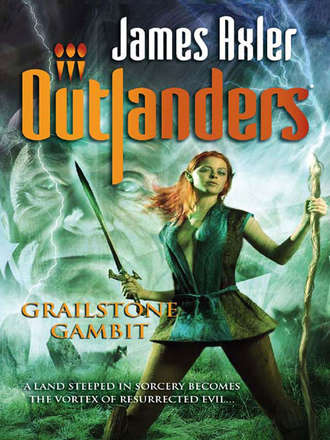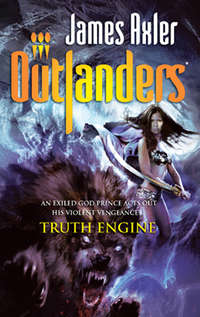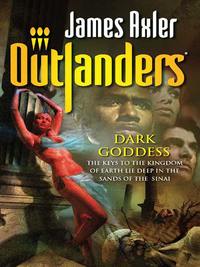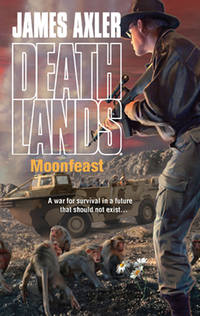
Полная версия
Grailstone Gambit
Grant cocked his head in puzzlement. “A what?”
“I can master minds not my own…like Shuma’s here.”
His gaze narrowed, Grant asked, “How can you do that?”
Esau’s shoulders jerked in what appeared to be a nervous tic but was an attempt to emulate a shrug. “By a variety of measures. The drugs help, of course.”
“Of course.”
“But I have the ability to stimulate certain parts of his brain so I can flood his nervous system with endorphins.” Esau paused for a handful of thoughtful seconds, then asked, “Do you know what those are?”
Grant nodded. “I do.”
“Then you know that when the nervous system is exposed to endorphins, a biochemical reaction takes place. The reasoning parts of the brain are inhibited.”
“And therefore easy to control,” Grant interjected.
Esau’s smile widened. “It doesn’t work the same for everybody. It helps if you’re a self-indulgent voluptuary in the first place, like Shuma.”
“I gathered that,” Grant replied dryly. “So you’re really the boss and Shuma is just the front man?”
“Something like that. Clever, wouldn’t you say?”
Grant nodded in grudging agreement. “I suppose so…Roamers would never take orders from a crippled little pissant like you.”
Esau’s lips tightened and he stepped closer to Grant, staring at him unblinkingly, as if challenging him to look away. Grant did not. “Are there any further questions?”
“Plenty of them, but first, where is the Wright woman?”
Esau’s brow acquired a line of concentration. “Oh, I do apologize. I should have reunited you much sooner. She can actually answer most of your other questions.”
“You don’t even know what they are.”
In a voice barely above a whisper, Esau stated, “You would ask me to reconsider leading the Survivalist Outland Brigade and join with Cerberus in an alliance against these so-called overlords…whatever they are.”
Grant stirred uneasily. “How do you know that?”
“Because that is what the Wright woman asked.”
“And what did you tell her?”
Esau turned toward Shuma. On the right side of his massive head, a thick vein pulsed. Shuma lumbered forward, grasped the back of Grant’s chair and lifted it clear of the floor without apparent effort. He turned it and set it down at a different angle.
Peering through the gloom, Grant saw heavy wooden beams supporting the ceiling. Four chains dangled from a block-and-tackle assembly attached to the rafters. The ends of the chains were tipped with sharp meat hooks of the type used in slaughterhouses.
From two of the hooks hung a naked body, gutted like the carcass of a pig he had seen once since in a butcher’s shop. One of the big hooks had been inserted through the underside of the chin, and the tip of another pierced the left armpit.
Through the fog of horror clouding his vision, Grant looked into the glassy, dead eyes of Wright.
Teeth clenched, a wordless snarl of rage vibrating in his throat, Grant hurled himself against his bonds, rocking the chair back and forth, hoping to tip it over on Esau. Shuma’s huge hands fell onto his shoulders, pressing him down, holding him motionless.
Esau lurched into view on his crutches, staring levelly into Grant’s eyes. “She told me quite a bit, but not everything. You’ll do that for me, Mr. Grant.”
“Goddamn you to Hell, you little mutie piece of shit.” His voice was so guttural with fury it sounded more like the growl of an animal.
Esau leaned forward, stroking the side of Grant’s face with tiny baby fingers. “God has done enough to me already, Mr. Grant. I do the damning to Hell here.”
His unnaturally large eyes suddenly seemed to increase in size, as if they were squirming from their sockets. Tiny red flames flickered within the pupils. Grant sensed rather than heard a multitude of tiny voices, all chittering like faraway crickets. The sound slid along the edges of his awareness, and terror pushed away his rage. His heartbeat thundered in his ears.
A nova of pain exploded within the walls of his skull and he heard himself crying out, as from a million miles away. His body spasmed, thrashed. He felt his mind being pulled into a whirlpool of dark energy that sucked his blood and bones and soul out through the pores of his skin, and turned them to dust.
He whirled, orbiting every instant of his life, spiraling through memories of joy, of loss, of grief, of victory and defeat. He spun through a sea of images, and no matter how hard he tried to stop them from flying to the forefront of his mind, he knew Esau saw them, rifled through them, memorized them.
The most intense pain gradually abated but didn’t fade completely. There was a ringing in his ears and numbness in his extremities. He felt blood inching from his right nostril and flowing over his lips. He breathed shallowly because of the bile burning in his throat. Then he doubled over and vomited between his legs. He felt as if a violent tornado had ripped a mile-wide path of destruction through the field of his mind.
Slowly raising his head, he squinted through his watering, blurred eyes toward Esau. The vein on the little man’s temple pulsed violently as if a worm squirmed just beneath the thin layer of flesh. The network of broken blood vessels on his forehead appeared to be even more livid. His arms trembled as if he was having difficulty maintaining his balance on the crutches.
“Interesting,” he said in a faint, tremulous voice. “Far more interesting than I thought it would be. I’m going to keep you alive a while longer, Mr. Grant…at least until your friends come to rescue you, an eventuality of which you seem certain. But it wouldn’t be so if our situations were reversed.”
A small, bronze-hued curve of metal clinked to the floor at Grant’s feet. He recognized it as the Commtact.
“You are quite isolated, my large friend,” Esau went on. “You live only at my sufferance and my continuing interest in your memories. Many of them are intriguing to the point of fascination.
“Shuma, I think he needs some fresh air. Take him to the cage.”
Chapter 5
A cold rain pattered down through the leaves that formed a loose canopy over the top of the cage. Grant shivered in the early-morning chill, but he turned his face upward so the raindrops fell into his open, as-dry-as-dust mouth.
The water soothed the cuts on his lips and cheek lining and eased his thirst somewhat. When the drizzle intensified, his torn T-shirt was quickly soaked through and plastered to his skin.
“Well, here I am,” he rasped, a little dismayed by how hoarse and weak his voice sounded.
Grant retained little memory of being half dragged, half carried to the cage by Shuma. His arms and legs refused to function, the muscles feeling as if they were filled with half-frozen mud. He wasn’t sure if the impaired movement was due to his being in a chair or an aftereffect of Esau’s psionic rape.
He tried to dismiss the concept, but he felt violated. Esau had virtually torn open his mind and ransacked its contents. Although he didn’t know exactly how the little man had accomplished it, he knew with a grim certainty there would be a final reckoning.
When the sun came up and filtered feebly through the interwoven branches, he moved carefully to the entry gate of the cage. Sliding his hands between the wooden slats, his fingers explored the iron padlock. He briefly considered ripping loose a splinter of wood and using it to pick the lock, but he discarded the idea when he saw a pair of armed men approaching him.
Grizzled, bearded Roamers, they didn’t warn him not to touch the lock. All they did was glare, and he withdrew his hands.
Biting back a profanity, Grant sat down and listened to the camp stirring around him, watching dim shapes hustle back and forth between shacks and cook fires. He grew cold in his wet clothes, but he maintained his stoic exposure. As a Magistrate, he had been taught techniques to manage pain and discomfort, but he wasn’t a Mag anymore. He realized with bleak humor that he had experienced more periods of physical suffering in the five years since his exile than during his entire two decades as a hard-contact Magistrate.
In his first few years as a Mag, as he rose up the ranks, he had undergone periodic training exercises to toughen him and increase his stamina, and that included exposure to extremes of temperature.
Even now he recalled those exercises with loathing. They were days of pure, unadulterated torture, of walking naked in a desert or clambering among rocky mountains, waiting for the commander to ration out just enough food and water to survive from one dawn to one sunset.
But Grant learned to live by instinct, reflex and training, to focus solely on putting one foot in front of the other and slogging on. Those of his fellow Mags who didn’t learn didn’t survive.
Despite the twinges of protest from his knee joints, Grant sat cross-legged and stared at a white spot on the floor of the cage, where the bark had peeled back from the wooden slat. He tried to relax his neck and shoulder muscles, working his way down to his bare, cold toes. He concentrated on regulating his respiration, putting himself into a quasihypnotic state.
He was trying to achieve the “Mag mind,” a technique that emptied his consciousness of all nonessentials and allowed his instincts to rise to the fore. He had been trained to do it while serving the Magistrate Division of Cobaltville. He used it for handling pain and dealing with exhaustion. Brigid Baptiste had referred to it as a form of yoga, but Grant still thought of the process as Mag mind.
After memorizing the white spot, he closed his eyes, visualizing it. He struggled to superimpose a mental image that matched the actual spot, but he was unable to do so. His concentration was scattered.
Grant wasn’t sure if it was due to the pains of the injuries inflicted by the SOBs or whether he was emotionally drained. Rather than seeing the white mark in his mind, he kept seeing Esau’s huge eyes with their red pupils, like a vid tape on continuous replay.
Despite his situation, worry about his friends consumed him. He felt sure the Cerberus personnel knew he still lived—in fact, they were probably aware of his general state of health, due to his biolink transponder.
All permanent residents of the Cerberus redoubt had been injected with subcutaneous biolink transponders that transmitted heart rate, respiration, blood pressure and brain-wave patterns. Based on organic nanotechnology, the transponders were composed of nonharmful radioactive chemicals that bound themselves to an individual’s glucose and the middle layers of the epidermis. The constant signal was relayed to the redoubt by the Comsat, one of the two satellites to which the installation was uplinked.
The telemetry transmitted from Grant’s subdermal biolink transponders would be directed down to the Cerberus redoubt’s hidden antenna array. Sophisticated scanning filters combed through the telemetric signals using special human biological encoding.
Although most satellites had been little more than free-floating scrap metal for well over a century, Cerberus had always possessed the proper electronic ears and eyes to receive the transmissions from at least two them. One was of the Vela reconnaissance class, which carried narrow-band multispectral scanners. It could detect the electromagnetic radiation reflected by every object on Earth, including subsurface geomagnetic waves. The scanner was tied into an extremely high resolution photographic relay system. Conceivably, they could fix Grant’s present position in Central Park—not that it would do him any good.
Kane was far too canny a tactician to try to penetrate the SOB’s camp in broad daylight. As it was, Grant knew he and Domi had somehow been identified and allowed to get as far as they had before being jumped. He assumed Esau’s mental powers were responsible.
He also assumed Esau planned to use him to lay a trap for Kane, Brigid, Domi and whoever else participated in a rescue attempt. He didn’t know if the little man wanted to capture them or kill them, but he had seemed exceptionally intrigued by what he had seen in Grant’s mind. He guessed the information about the Annunaki overlords was of special interest, since it was connected to the fall of the united baronies.
Humankind’s interaction with a nonhuman species had begun at the dawn of Earth’s history. That relationship and communication had continued unbroken for thousands of years, cloaked by ritual, religion and mystical traditions.
According to information gathered by the Cerberus personnel over the past few years, most myths regarding gods and aliens derived from a race known in ancient Sumerian texts as the Annunaki, but also known in legend as the Dragon Kings and the Serpent Lords.
A species of bipedal reptiles that appeared on Earth at the dawn of humanity’s development, the Annunaki arrived from the extrasolar planet of Nibiru. They reared great cities, built civilizations and spaceports and influenced the evolution of humankind.
The Annunaki were also consumed by abounding pride and arrogance, and more than a few maintained an insatiable appetite for conquest and control. The faction led by Enlil had developed and imposed complex, oppressive caste and gender systems on early human cultures to solidify that control.
As far as Enlil was concerned, the nukecaust was a radical form of remodeling and fumigation. The extreme depopulation, as well as the subsequent atmospheric and geological changes, approximated Nibiruan conditions. Earth would become the new Nibiru.
Before that occurred, Cerberus was determined to build some sort of unified resistance against Enlil and the other overlords, but the undertaking proved far more difficult and frustrating than Grant had imagined. Even long months after the disappearance of the barons, the villes were still in states of anarchy, with various factions warring for control on a daily basis.
Grant heard a murmur of many voices rising around him like the sound of rushing water. Opening his eyes, he saw a crowd of about twenty people gathered below the cage, clustered around it like a swarm of bees.
Most of them were Roamers, a rough-looking gang—bearded, wild haired, wearing a variety of rags and furs.
A tall woman strode up to the cage and leaned forward to stare between the slats. She stood well over six feet tall, naked to the waist except for crisscrossing cartridge belts over her blue-tattooed breasts. Tattoos writhed all over her bare arms and torso, like a formfitting body suit imprinted with fantastic designs.
She wore green camouflage pants and high-topped boots. Her black hair was cropped to her scalp except for a crest that sprouted up six inches from the center of her skull. The ends of it were dyed a bright purple. Silver-studded red leather bands encircled her wrists. She cradled a heavy Stoner M-207 machine gun in her muscular arms.
At one time her blue-eyed face might have been pretty, but that was before it was disfigured by the wide cicatrix scar indenting her left cheek like a fault in snowy terrain.
She stared speculatively at Grant, and Grant gazed at her. Neither person spoke for a long moment, then the woman turned and nodded to her companions. “Yep, it’s him all right. It’s Grant, just like Shuma said.”
Grant stirred uneasily. “You know me?”
The woman turned back to him. “We’ve never been formally introduced. We traded shots about eighteen years ago, in the Great Sand Dunes hellzone. You ’member that?”
Grant did, and the memories weren’t pleasant. He and a Magistrate squad had been ambushed by a group of surprisingly well-armed Roamers. He touched his left cheek. “I give you that?”
She uttered a spitting sound of derision. “Shit, no. My first husband did, back when I was a sprout. Claimed I was steppin’ out on him. Hell, I was only fourteen. But I kilt him for it all the same. Had me six more husbands since then.”
A bell of recognition chimed faintly in Grant’s memory. “Didn’t you used to be called the Merry Widow?”
The woman grinned in genuine amusement. “Called that still. Glad to find out I still have a rep…wasn’t sure with all this fuss made over that Shuma bastard and this SOB of his.”
The derogatory tone in the woman’s voice caught Grant’s attention. “You’re not a part of it?”
The Merry Widow shook her head. “Not yet. Brought my people here to check the whole thing out. Lot of other clans I have problems with are here. Can’t say I’m too inclined to take orders from a mutie, neither, much less a fuckin’ scalie.”
Grant inched closer to the bars. “You’re only about half right.”
Lines furrowed her brow. “What do you mean?”
Grant eyed the Roamers standing behind the Merry Widow and asked, “Are all these your people?”
She nodded.
“Can you trust them?”
“Trust ’em to do what?”
“Not to sell you out.”
“Why would they do that?”
Dropping his voice to a whisper, Grant said, “Because I’ve got some information that you might find pretty interesting. But I think it should it be for your ears only.”
The Merry Widow opened her mouth to retort, closed it, then turned, sweeping the ragtag band with a challenging stare. She made a brushing gesture with her right hand. “Fade.”
Reluctantly, the Roamers shuffled away, some of them casting Grant resentful glares, others looking merely puzzled.
The woman turned back to Grant. “Spill, sec man.”
Grant felt the back of his neck heating with a flush of anger. “Sec man” was an obsolete term dating back to preunification days when self-styled barons formed their own private armies to safeguard their territories. It was still applied to Magistrates in the far hinterlands beyond the villes.
He swallowed his irritation and said lowly, “Shuma is just the puppet. A crippled mind-mutie named Esau really pulls the strings.”
The Merry Widow eyed him skeptically. “I thought that little slug was his ass-wipin’ servant or something.”
“That’s what he wants you to believe. He’s really the brains of the whole outfit.”
Taking a deep breath, Grant told the Roamer chieftain everything he had witnessed and been told by Esau. He didn’t embellish or even try to conceal the reasons he and his friends were in Manhattan. He spoke directly and honestly. He knew the Merry Widow distrusted him and didn’t blame her.
His own work with the Cerberus exiles kept him in a shadow world of danger and eternal suspicion, of sudden crisis and alarm, where human beings died in a covert war that ranged from the sands of the Black Gobi to the utter remoteness of a forgotten colony on the Moon.
When he was done, the woman’s scarred features were drawn in a troubled frown. “I don’t like that,” she murmured. “Not a’tall. But…”
She trailed off and after waiting a few seconds Grant demanded, “But what?”
The Merry Widow shrugged. “But Shuma has made plans for you, and everybody is lookin’ forward to it.”
Grant felt his stomach lurch. “Plans?”
The woman nodded. “Yeah, a big parade down the street with you as the main trophy. A lot of people in this camp don’t like you, Grant.”
The corner of her mouth quirked in a wry smile. “Go figure, huh?”
“Yeah,” he echoed. “Go figure.”
Contemplatively, she continued, “But a lot of people in this camp don’t like taking orders from a scalie in the first place, and they sure as shit won’t like it if they find out they’re really taking orders from a little runt of a doomie on crutches.”
Gusting out a sigh, the Merry Widow ran a hand over the purple-dyed tips of her hair. “Mebbe there’s something we can do about that. Lemme think on it.”
Chapter 6
Kane ran across the rooftop with a long-legged stride. As soon as he had seen the geyser of steam burst from the Cadillac’s radiator, he dropped the OICW, leaped to his feet and started running.
A chorus of outraged screams and panicked yells erupted from the crowd below, and he smiled in grim satisfaction.
“Kane,” came Brigid’s voice into his head. She sounded more indignant than confused or concerned. “What the hell is going on?”
“Keep standing by,” he told her.
“I’ve been standing by. I need to know—”
Reaching up to the Commtact, he cut the channel. He knew she would heap vituperation on him when next they spoke, but he couldn’t afford a distraction. He heard the distant whip-crack of a rifle shot, and the angry yells from the crowd hit a fever pitch of fear. Either Edwards or Brady was taking the initiative.
Kane wasn’t concerned about leaving the OICW behind. His first priority was reaching street level as soon as possible, and so he concentrated on running. The Sin Eater snugged in its forearm holster weighed considerably less than the rifle, although the four grenades attached to the combat webbing beneath his jacket bounced painfully against his ribs.
Racing across the roof, he leaped nimbly over haphazard heaps of unidentifiable junk. He angled away from the cupola enclosing the stairway. He had no inclination to be trapped in the stairwell by enraged Roamers who he was sure were on their way up.
Obeying an impulse triggered by his point man’s sense, Kane had decided to stop Shuma’s vehicle rather than snipe at live targets. He wasn’t sure why he had reached his decision, but he put a great faith in his instincts as a general rule.
When Kane’s point man’s sense howled an alarm, he usually paid attention. His point man’s sense was really a combined manifestation of the five he had trained to the epitome of keenness. Something about Shuma and his big-headed companion—some small, almost unidentifiable stimulus—had triggered the mental alarm.
Sprinting across the flat surface of the roof, he reached the edge and took an alleyway yawning before him in a single leap. He misjudged the distance to the adjacent building and landed too hard, falling onto his right side and rolling over and over. He came to a halt when he slammed up against the brick facade of a chimney.
Biting back a curse, he quickly examined the scrapes on the palms of his hands, then rose to a knee. Across the alley he heard a door slam open and he cast a glance over his shoulder.
A pair of bearded Roamers bulled their way out of the cupola, looking this way and that. Both men cradled lightweight deer rifles in their arms. Kane gauged the weapons to be .22-caliber, and therefore they had little stopping power unless the shooters were very accurate. He assumed the Roamers would be, so he sidled out of sight on the opposite side of the chimney.
The two men glared around with wild, angry eyes and when they spotted the OICW lying on the rooftop, they jogged toward it. Kane took advantage of their distraction to stand up and start running again.
He heard a wordless bellow of rage behind him, then the snapping of a rifle shot. A bullet drilled into a stack of lumber on his right, throwing up a little cloud of splinters. Increasing his speed and the length of his stride, he reached the far edge of the roof and dived off it, to the building fifteen feet below.
Kane landed on the balls of his feet, and he threw himself forward into a somersault. The layer of rotting wood and roofing material sagged beneath his weight and collapsed inward. He dropped amid a seething cascade of plaster, drywall, boards, insulation and broken rafters.
Fortunately, he didn’t fall far, but the impact still very nearly jolted all the wind from his lungs. Gasping, his vision blurred, Kane dragged himself to his hands and knees, hearing splintery shards and timbers crashing down all around him. The swirl of dust and dirt particles stung his eyes and coated his tongue.
Coughing, fanning the air in front of his face, he staggered to his feet, glancing up at the ragged hole his hurtling body had made in the ceiling. Faintly, he heard the Roamers yelling in frustration, but he doubted they would risk following him. They no doubt hoped he had broken his neck or at the very least his back in the fall.








